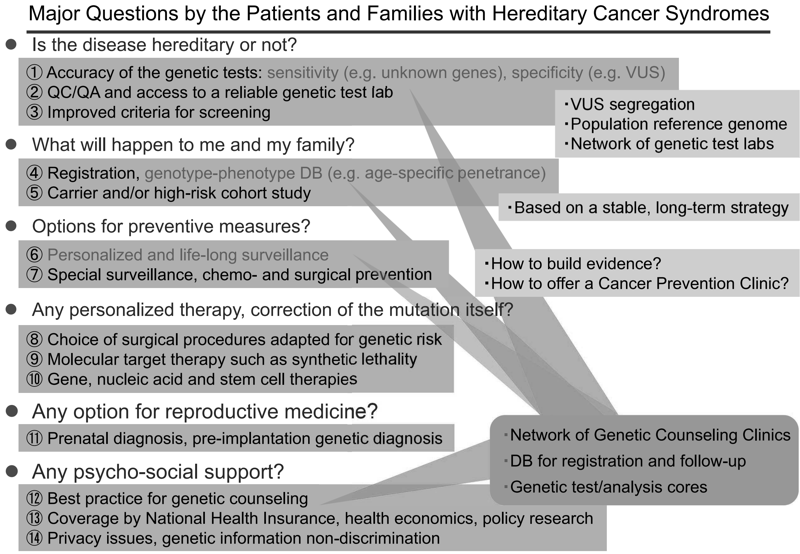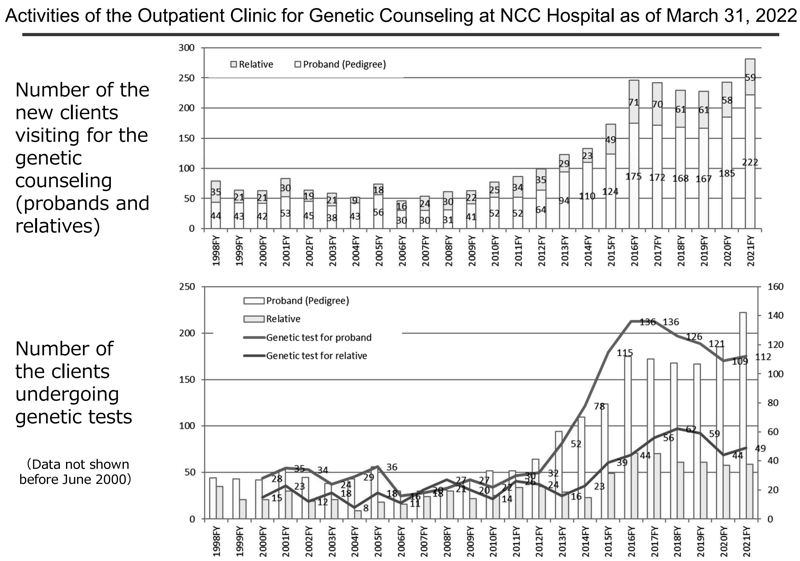Annual Report 2021
Department of Genetic Medicine and Services
Teruhiko Yoshida, Makoto Hirata, Kokichi Sugano, Shigenobu Suzuki, Mitsuya Ishikawa, Nobuyoshi Hiraoka, Shigeki Sekine, Taisuke Mori, Kuniko Sunami, Noboru Yamamoto, Nozomu Kobayashi, Hiromi Sakamoto, Masahiro Gotoh, Mineko Ushiama, Takashi Kohno, Mamoru Kato, Hitoshi Ichikawa, Noriko Tanabe, Sayuri Hiraoka, Tomoko Watanabe
Introduction
It has been estimated that roughly 5% of all cancer cases are caused by a highly penetrant monogenic mutation. Major causative genes for most hereditary cancer syndromes were identified in the 1990s, and since then, genetic diagnosis has been considered as a part of standard medical care in oncology clinics. The National Cancer Center Hospital (NCCH) launched the Outpatient Genetic Counseling Clinic in 1998 as a part of collaboration with the NCC Research Institute, especially the Fundamental Innovative Oncology Core (FIOC). However, cancer medical genetics still has a number of issues to be addressed as shown in Figure 1.

The Team and What We Do
The Department of Genetic Medicine and Services (GeMS) consists of 11 doctors, eight researchers, and two genetic counselors. All of these staff hold a concurrent post of another department and research division, except the genetic counselors.
As shown on the NCCH website, the aim and mission of the clinical service of the Outpatient Genetic Counseling Clinic, which are the major routine clinical activities of our department, are:
1) To provide consultation and appropriate medical and genetic information (that is, genetic counseling) to anyone who has a worry related to heredity cancer.
2) To provide genetic testing when appropriate.
3) To support early diagnosis and treatment based on family history and/or genetic test results.
4) To discuss clinical sequencing results of patients by participating in the expert panel.
For the April 2021 to March 2022 period, 418 clients and their relatives visited the Clinic. Of these, 222 families and 281 clients newly visited this period. In total, 2,081 families have visited the clinic since its inception in 1998. Details are shown in Table 1 and Figure 2.
In addition to the traditional genetic counseling services, the Department has been playing a critical role in the comprehensive genomic profiling (CGP) of cancer cells performed under the national health insurance systems since June 1, 2019. In particular, the expertise of the Department has been required to evaluate the possibilities of hereditary cancer syndromes and to advise the attending physicians about necessary steps in medical genetics. Moreover, the Assistant Chief of the Department serves as one of the chairpersons of the weekly expert panel.
Table 1. Number of new clients (Apr. 2021 – Mar.
2022) 


Research activities
The staff of the Department of GeMS have established a new Common Protocol to perform NGS-based germline clinical sequencing for patients with negative test results by conventional genetic tests, who would represent a part of the Undiagnosed Disease Patients in the oncology field. The Common Protocol has been adopted by other hospitals and institutions in a long-standing multi-institute collaborative research group based on the National Cancer Center Research and Development Fund and its predecessor. In addition to whole exome/genome sequencing (WES/WGS), a multi-gene panel has been developed based on Agilent SureSelect technology.
The Department of GeMS has also participated in several research projects related to the whole genome sequencing projects for cancer promoted by the Japanese government.
Clinical trials
The staff of the Department of GeMS itself have not acted as principal investigators of clinical intervention trials but have participated in prospective clinical studies to develop and evaluate the CGP tests for hematological malignancies and the TOP2 CGP panel conducted by the Japanese Children's Cancer Study Group (JCCG) since this year.
Education
The Department has accepted attendees for outpatient genetic counseling, so that they could be eligible to take the examination for clinical geneticists and certified genetic counselors acknowledged by the Japanese Society of Human Genetics and the Japanese Society of Genetic Counseling. In 2020, five doctors registered as trainees for clinical geneticists in the education committee of clinical geneticists. Furthermore, from this year, we accepted one certified genetic counselor from the International Medical Center of Saitama Medical University and one graduate student in Keio University.
Future Prospects
The advent of Precision Medicine, the primary purpose of which is to identify actionable and druggable targets for cancer chemotherapy, has been generating a substantial number of the germline "secondary" findings, especially from the T-only CGP panel. It has certainly increased the number of clients visiting the outpatient clinic of the Department of GeMS, and the trend will continue in the future along with the evolution of Precision Medicine. However, our traditional clients, who visit the Outpatient Genetic Counseling Clinic based on their concerns about a cancer genetic predisposition, are of course very important and still the main subjects of our clinical and research activities. In other words, there exist two genomic medicines in cancer, one for treatment, mostly somatic, and the other for prevention, primarily germline. The major problem in Japan is that the implementation in the universal health care system of the latter, germline genomic medicine of cancer prevention for high risk groups is largely lagging behind. The Department will keep working to make the two cancer genomic medicines equally available to everyone who needs them.
List of papers published in 2021
Journal
1. Takamizawa S, Morizane C, Tanabe N, Maruki Y, Kondo S, Hijioka S, Ueno H, Sugano K, Hiraoka N, Okusaka T. Clinical characteristics of pancreatic and biliary tract cancers associated with Lynch syndrome. Journal of hepato-biliary-pancreatic sciences, 29:377-384, 2022
2. Yagi Y, Abeto N, Shiraishi J, Miyata C, Inoue S, Murakami H, Nakashima M, Sugano K, Ushiama M, Yoshida T, Yamazawa K. A novel pathogenic variant of the FH gene in a family with hereditary leiomyomatosis and renal cell carcinoma. Human genome variation, 9:3, 2022
3. Suzuki K, Igata H, Abe M, Yamamoto Y. Multiple cancer type classification by small RNA expression profiles with plasma samples from multiple facilities. Cancer science, 2022
4. Tomida A, Chiyonobu T, Tokuda S, Miyachi M, Murashima K, Hirata M, Nakagawa M, Iehara T, Kuroda J, Takayama K. Pleomorphic rhabdomyosarcoma in a young adult harboring a novel germline MSH2 variant. Human genome variation, 9:8, 2022
5. Takamiya A, Ishibashi Y, Makise N, Hirata M, Ushiku T, Tanaka S, Kobayashi H. Imaging characteristics of NTRK-rearranged spindle cell neoplasm of the soft tissue: A case report. Journal of orthopaedic science: official journal of the Japanese Orthopaedic Association, 2022
6. Ishizu K, Hashimoto T, Naka T, Yatabe Y, Kojima M, Kuwata T, Nonaka S, Oda I, Esaki M, Kudo M, Gotohda N, Yoshida T, Yoshikawa T, Sekine S. APC mutations are common in adenomas but infrequent in adenocarcinomas of the non-ampullary duodenum. Journal of gastroenterology, 56:988-998, 2021
7. Nakagawa M, Kobayashi E, Yamada M, Watanabe T, Hirata M, Tanabe N, Ushiama M, Sakamoto H, Sato C, Mori T, Yoshida A, Yoshida T, Sugano K, Kawai A. Myxofibrosarcoma harboring an MLH1 pathogenic germline variant associated with Muir-Torre syndrome: a case report. Hereditary cancer in clinical practice, 19:34, 2021
8. Yamaguchi K, Kasajima R, Takane K, Hatakeyama S, Shimizu E, Yamaguchi R, Katayama K, Arai M, Ishioka C, Iwama T, Kaneko S, Matsubara N, Moriya Y, Nomizu T, Sugano K, Tamura K, Tomita N, Yoshida T, Sugihara K, Nakamura Y, Miyano S, Imoto S, Furukawa Y, Ikenoue T. Application of targeted nanopore sequencing for the screening and determination of structural variants in patients with Lynch syndrome. Journal of human genetics, 66:1053-1060, 2021
9. Shimamoto Y, Ishiguro S, Takeuchi Y, Nakatsuka SI, Yunokizaki H, Ezoe Y, Nakajima T, Matsuno K, Nakahira H, Tanaka K, Ishihara R, Takayama T, Yoshida T, Ishikawa H. Gastric neoplasms in patients with familial adenomatous polyposis: endoscopic and clinicopathologic features. Gastrointestinal endoscopy, 94:1030-1042.e2, 2021
10. Nakano Y, Satomi K, Okada K, Gotoh M, Ushiama M, Sakamoto H, Yoshida T, Kunihiro N, Hira K, Fukushima H, Inoue T, Hirato J, Ichimura K, Hara J. Malignant brain tumor in an infant showing histopathological features of yolk sac tumor but genetic and epigenetic features of AT/RT. Pediatric blood & cancer, 68:e29192, 2021
11. Ueki A, Sugano K, Misu K, Aimono E, Nakamura K, Tanishima S, Tanaka N, Mikami S, Hirasawa A, Ando M, Yoshida T, Oya M, Nishihara H, Kosaki K. Germline Whole-Gene Deletion of FH Diagnosed from Tumor Profiling. International journal of molecular sciences, 22:2021
12. Liu X, Yamaguchi K, Takane K, Zhu C, Hirata M, Hikiba Y, Maeda S, Furukawa Y, Ikenoue T. Cancer-associated IDH mutations induce Glut1 expression and glucose metabolic disorders through a PI3K/Akt/mTORC1-Hif1α axis. PloS one, 16:e0257090, 2021
13. Endo Y, Fujimoto M, Ito N, Takahashi Y, Kitago M, Gotoh M, Hiraoka N, Yoshida T, Kitagawa Y, Kanai Y, Arai E. Clinicopathological impacts of DNA methylation alterations on pancreatic ductal adenocarcinoma: prediction of early recurrence based on genome-wide DNA methylation profiling. Journal of cancer research and clinical oncology, 147:1341-1354, 2021
